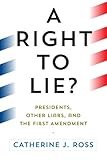A Right to Lie? : Presidents, Other Liars, and the First Amendment / Catherine J. Ross.
Material type: TextPublisher: Philadelphia : University of Pennsylvania Press, [2021]Copyright date: ©2021Description: 1 online resource (144 p.)Content type:
TextPublisher: Philadelphia : University of Pennsylvania Press, [2021]Copyright date: ©2021Description: 1 online resource (144 p.)Content type: - 9780812299731
- 342.7308/53 23
- KF4772
- online - DeGruyter
| Item type | Current library | Call number | URL | Status | Notes | Barcode | |
|---|---|---|---|---|---|---|---|
 eBook
eBook
|
Biblioteca "Angelicum" Pont. Univ. S.Tommaso d'Aquino Nuvola online | online - DeGruyter (Browse shelf(Opens below)) | Online access | Not for loan (Accesso limitato) | Accesso per gli utenti autorizzati / Access for authorized users | (dgr)9780812299731 |
Frontmatter -- CONTENTS -- PART I. TRUTH MATTERS -- 1. Something Is Rotten -- PART II. NO HARM, NO FOUL -- 2. Surprise, Lies Are Protected Speech: United States v. Alvarez -- 3. Incredible Lies: Defamation and Birtherism -- PART III. LIES AFFECTING DEMOCRACY -- 4. The Ministry of Truth: Uncontrollable Campaign Lies -- 5. Viral Lies: Life and Death in the COVID-19 Era -- 6. The President Works for Us -- 7. Lies Matter -- Notes -- Index -- Acknowledgments
restricted access online access with authorization star
http://purl.org/coar/access_right/c_16ec
This short book addresses an urgent issue: Do the nation's highest officers, including the President, have a right to lie protected by the First Amendment? The need to understand the status of lies under the Speech Clause grows more relevant by the day. Pervasive assaults on the very notion of shared facts and truth combined with widespread misinformation endanger informed public debate, functional governance, and even lives in the face of a worldwide pandemic.In Presidential Lies, the First Amendment, and Democracy, legal scholar Catherine J. Ross addresses three questions: First, does freedom of expression include the right to lie? Second, if free speech includes the right to lie, do Presidents retain that right in the course of their official duties? And, third, if the answer to the first two questions is "yes," is there any potential remedy that would not violate a President's First Amendment rights? Perhaps counterintuitively, the answers to the first two questions are "yes," broadly speaking. To address this, Ross proposes a constitutionally viable solution, drawing on the law governing the speech of public employees, whose communication within the scope of their official duties does not receive the same First Amendment protection as the speech of ordinary citizens.Presidents, Ross argues, rarely if ever speak outside their official duties. They are always on duty as public employees—retained by the people to "take Care that the Laws be carefully executed." Other public servants sacrifice some of their speech rights as a condition of employment: the state can fire them for what they say publicly "pursuant to their official duties." Congress can—and should—put future presidents on notice that material lies to the public on substantial matters will be deemed a "high crime and misdemeanor" subject to congressional censure and even impeachment.
Mode of access: Internet via World Wide Web.
In English.
Description based on online resource; title from PDF title page (publisher's Web site, viewed 01. Dez 2022)


